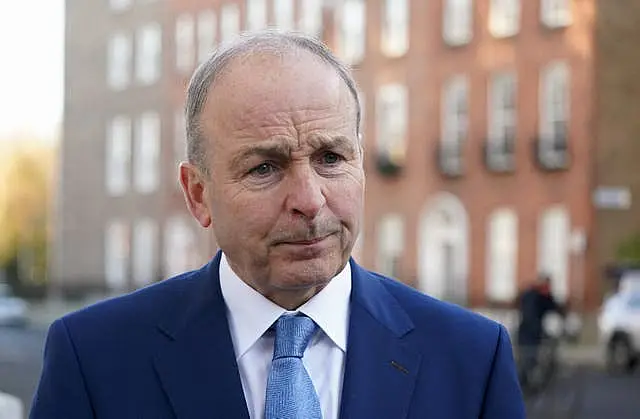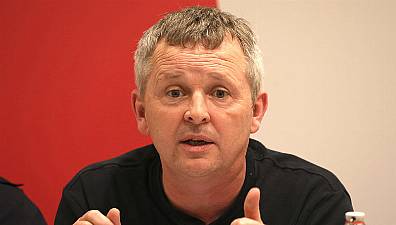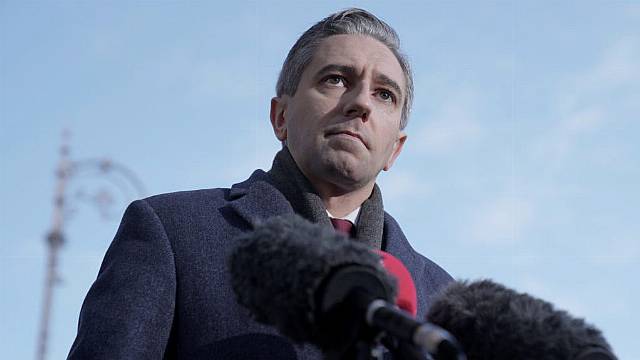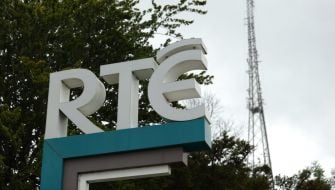A Sinn Féin manifesto pledge to investigate RTÉ’s objectivity is a “dog whistle to conspiracy theorists”, the Taoiseach has said.
Fine Gael leader Simon Harris and Tánaiste and Fianna Fáil leader Micheal Martin both heavily criticised the proposal, with Mr Martin branding it a “dangerous departure”.
In its General Election manifesto published on Tuesday, Sinn Féin said it would commission an “independent human rights and journalist expert review into the objectivity of coverage by RTÉ of the Israeli genocide in Gaza and other international conflicts”.
Arriving separately for a Cabinet meeting at Government Buildings in Dublin on Wednesday, Mr Harris and Mr Martin both raised concerns over the proposed examination of how Ireland’s national broadcaster has covered the bloodshed in Gaza and its reporting on other war zones.
The Taoiseach said: “I just can’t imagine this scenario in any functioning democracy that a political party that wants to lead a government would put in its manifesto, in its list of political promises to the Irish people, that it will establish an independent review of RTÉ’s objectivity and news coverage.”
Questioning where the Sinn Féin policy would stop, Mr Harris asked if the party would later probe matters beyond the Middle East, and added: “RTÉ today, who tomorrow?”
He called on Sinn Féin leader Mary Lou McDonald to withdraw the “chilling, despicable” proposal.
“To actually even suggest that RTE needs to be independently reviewed is a dog whistle to conspiracy theorists, is an effort to undermine media freedom in this country, and I, quite frankly, believe it’s an effort to intimidate journalists from the work that they do,” Mr Harris said.
“What was she thinking?”
Mr Martin said he was “shocked” by the proposal.
“Political parties can’t be setting up committees to investigate the media,” he said.
“We may all have complaints and so on like that. But this is a dangerous new departure. It’s almost a threat to the media, really, that you know ‘we’ll be coming after you, because we don’t believe you are being objective’.

He said the implication was that Sinn Féin does not believe RTÉ is objective in its reporting of the Middle East. Mr Martin said he found it hard to give credit to such an assertion.
“I think it’s a dangerous departure in terms of, essentially, what Sinn Féin are saying ‘if your views don’t accord with ours, then we’re going to set up a committee to investigate you’,” he added.
Sinn Féin president Ms McDonald defended the measure at the manifesto launch in Dublin on Tuesday morning, insisting “peer review” processes were common in every professional walk of life.
She made clear the independent review would be carried out by media and human rights experts and would not involve political interference.
Ms McDonald said confidence in the national broadcaster was “absolutely key”.
She said she did not think the line dividing government and the media would become murky if such a review of RTÉ was commissioned.

“This is a matter of trust and a matter of confidence, it is a matter of peer review,” she said.
“This happens in virtually every professional walk of life. Peer review is standard. It’s a standard, standard process.”
She said it could prove “a very, very healthy, very worthwhile exercise – not to be done by politicians, but by human rights (experts) and journalists themselves”.

A spokeswoman for RTÉ said: “Impartiality and objectivity are among the cornerstone principles of RTE and the organisation’s own journalism guidelines.
“Section 46L (1) of the Online Safety & Regulation Act 2022 imposes a specific obligation to report in ‘an objective and impartial manner and without any expression of the broadcaster’s own views’.
“The Oireachtas established CnaM (Coimisiun na Mean) as an independent statutory body with power to hold broadcasters accountable for compliance with the legislation and the broadcasting codes.”







